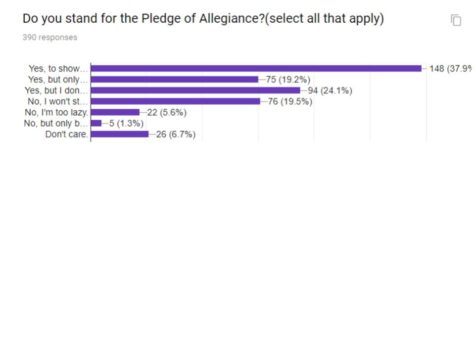Take a stand… Or don’t
I pledge allegiance,
To the flag,
Of the United states of America,
And to the republic,
For which it stands,
One nation,
Indivisible,
For liberty and justice for all.

These are the words that come out of millions of students everyday in America. Of course, no one is forcing them too. Under the law, schools and teachers are not allowed to force, or directly influence, students to say the pledge. Many cases, such as West Virginia board of education v. Barnette in 1943, have caused Congress to declare that it is not required for the student to stand of the pledge of Allegiance. Felix Frankfurter, a previous associate supreme court justice, said that “The very purpose of a Bill of Rights was to withdraw certain subjects from the vicissitudes of political controversy, to place them beyond the reach of majorities and officials and to establish them as legal principles to be applied by the courts.”
That being said, most states, including Connecticut, require public schools to recite the Pledge of Allegiance. The Pledge was established as a law in Congress in 1942, 152 years ago when Franklin Roosevelt signed a paper about education. While some stand for the Pledge, others, such as Jeffrey Owen Jones and Peter Meyers(co-authors that wrote a book about the pledge of allegiance) , think of it as “an accident of history.”
With a new president and new policies, whether to stand or not stand for the Pledge of Allegiance has become more debatable. Some people are feeling unpatriotic with the kneeling event and Trumps actions(Daca removal, muslim travel ban, etc). They claim there isn’t any liberty or justice in America.
At Hall, according to the poll results sent out via email asking about people’s stance on the pledge of allegiance, 19.6% of people refuse to stand for the flag(The poll taken offered multiple options, and it also offered the option of selecting more than one answer. Therefore, each statistic can only be analyzed individually). 37.9% choose to stand for patriotism, but there is a possibility that statistics is only that number because of peer pressure as 19.3% say they only stand because the people around them do. 6.7% don’t care and 5.4% are simply too lazy to bother standing. Then there are the 24.2% of people who stand, but don’t state the pledge.

Just as important as the statistics are the 142 responses. Peer pressure seems to play a lot into standing or not standing for the Pledge. That is quite alarming, as America is seen to be a free country, and other’s decision should not take part in yours.. There were responses similar to:
“I would sit (for current political reasons) but I’m too afraid of being judged by classmates”-Anonymous student.
“afraid my teacher will get mad at me if I don’t stand”-Anonymous student.
“I was taught to do so when I was younger, in elementary school.”-Anonymous student.
Let this be clear by the law: Whether you stand or don’t stand is your choice, teachers or other students have no right to force you into any action. At the same time, just because people in your class don’t say it doesn’t mean you can’t.
(One of the responses was “people in my class don’t say it”)
It is understandable that peer pressure does influence your decision, as being the only one not standing, or worse, the only one standing is very awkward. As long as you know at heart what your decision is.
As for the ones who do stand because they wish to show patriotism and respect stand because they wish to show respect to their family members and the veterans.
“Because I want to honor those who died for our freedom”-Anonymous student.
Even though they stand, they are not unaware of the other perspectives.
“I mean like America’s pretty screwed but I mean it’s out of respect for our veterans”- Anonymous student.
The ones who do not stand do it out of their disagreement with some current policies in America. They don’t believe that there is “liberty and justice for all.”
“I love my country but do not like the state it’s in. Until we have moved closer to equality, I can’t in good conscience pledge allegiance” – Anonymous
Most of the issues they have with the Pledge seem to stem from either President Trump, racism, or sexism. They think America hasn’t done anything worthwhile to stand for. However, just like the those who chose to stand, they are not blind to the other side.
“Why would I stand for a country that sees me and my people as subhuman? Before anyone claims it’s disrespectful, you should see the veterans who kneel too.”-Anonymous
What seems to be debated the most in general, however, seems not to be whether to stand or not to stand, but the the phrase “under God.” The big problem with saying “under God” is that it apparently disrespects atheists and is not suitable for religions that believe in more than one God. According to the Washington Times, a poll was run that deduced 34% of Americans wish for the phrase “under God” to be removed.
Multiple mentions of the phase “under God” was mentioned in the school poll as well, whether or whether not they agree with standing or not standing.
Regardless of what your decision may be, remember to respect the your peer’s decision. Out of the 2 people interviewed, Oliver Gibson and Mr. Misiaszek, both agree that whether you stand or do not stand, the choice is yours.
“I personally prefer to stand, but I also acknowledge that it’s a free country…if someone’s opinion is different from mine, I don’t have the right to be mad at them,” Mr. Misiaszek says.
“I believe people should have the right to stand if they want to stand or sit if they want to sit, they shouldn’t be forced to do either,” Oliver Gibson says.
